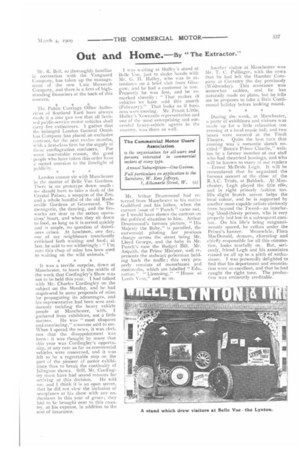Out and Home.—By "The Extractor."
Page 5

If you've noticed an error in this article please click here to report it so we can fix it.
Mr. R. Bell, so thoroughly familiar in connection with the Vanguard Company, has taken up the management of the new LJnic Mo:orcab Company, and there is a firth of highstanding financiers at the back of this concern.
The Public Carriage Office Authorities of Scotland Yard have always made it a sine qua non that all licensed public-service motor vehicles shall carry fire extincteurs. I gather that the enlarged London General Omnibus Company has placed an exclusive contract, for the next twelve months, with a first-class firm for the supply of these conflagration confusers. For some inscrutable reason, the good people who have taken this order have a rooted aversion to the limelight of publicity.
London cannot vie with Manchester in the matter of Belle Vile Gardens. There is no prototype down south : we should have to take a dash of the Crystal Palace, a soupcon of the Zoo, and a whole handful of the old Rosheryille Gardens at Gravesend. The menagerie, the dancing, and the fireworks are dear to the cotton operatives' heart, and when they sit down to food, as long as it is served quickly and is ample, no question of daintiness arises. At luncheon, one day, one of my neighbours trenchantly criticised both waiting and food; at last, he said to me witheringly : " I'm sure this chap of mine has been used to waiting on the wild animals."
It was a terrific surprise, down at Manchester, to learn in the middle of the week that Cordingley's Show was not to be held this year. I had talked with Mr. Charles Cordingley on the subject on the Monday, and he had acquiesced in some proposals of mine for propagating its advantages, and his representative had been seen assiduously tackling the heavy vehicle people at Manchester, with, I gathered from exhibitors, not a little success_ He was " most eloquent and convincing," someone said to me. When I spread the news, it was obvious that the disappointment was keen : it was thought by many that this year was Cordingley's opportunity, at any rate as far as commercial vehicles were concerned, and it was felt to be a regrettable step on the part of the pioneer of motor exhibitions thus to break the continuity of Islington shows. Still, Mr. Cordingley must have had sound reasons for
arriving at this decision. He told me, and I think it is an open secret, that he did not view the inclusion of aeroplanes at his show with any enthusiasm in this year of grace ; they had to be brought over to this country, at his expense, in addition to the cost of insurance. I was waiting at Halley's stand at Belle Vile, just to shake hands with Mr. G. II. Halley, who was in attendance on a brief visit from Glasgow, and he had a customer in tow. Presently he was free, and he remarked cheerily : " That makes IS vehicles we have sold this month (February)." That looks as if business were moving, Mr. Frank Little, Halley's Newcastle representative and one of the most enterprising and successful heavy-vehicle agents in the country, was there as well.
Mr. Arthur Drummond had returned from Manchester to his native Guildford and his lathes, when the current issue of " Punch " came out, or I would have shown the cartoon on the political situation to him. Arthur Drumnmnd's famous picture, " His Majesty the Baby," is parodied, the nursemaid piloting her precious charge across the street being Mr. Lloyd George, and the baby in Mr. Punch's case the Budget Bill. Mr. Asquith, the Prime Minister, well represents the stalwart policeman holding back the traffic; this very properly consists of motorbuses and motorcabs, which are labelled " Education," " Licensing," " House of Lords Veto," and so on. Another visitor at Manchester was Mr. T. C. Pullinger, with the news that he had left the Humber Company at Coventry the day previously (Wednesday). This severance was somewhat sudden, and he has naturally made no plans, but he tells me he proposes to take a little Continental holiday before looking round.
During the week, at Manchester, a party of exhibitors and visitors was nutde up for a little relaxation one evening at a local music hall, and two boxes were secured at the Tivoli
Theatre. Quite the best turn that evening was a romantic sketch entitled " Bonnie Prince Charlie," written by a former member of our staff who had theatrical leanings, and who will be known to many of our readers ----Ernest McBride Legh. It will be remembered that he organised the famous concert at the close of the R.A.C. Trials, at Baldock. At Manchester, Ugh played the title role, and in right princely fashion too. His slight Scotch accent helps the local colour, and he is supported by another most capable artiste obviously from beyond the Tweed—an interfering blood-thirsty person, who is very properly laid low in a subsequent combat. On his life's being magnanimously spared, he enlists under the Prince's banner. Meanwhile, Flora MacDonald, demure, charming and chiefly responsible for all this commotion, looks tearfully on. But, seriously, friend Ugh and his associates roused us all up to a pitch of enthusiasm. I was personally delighted to find that his deportment and enunciation were so excellent, and that he had caught the right tone. The production was eminently creditable.
























